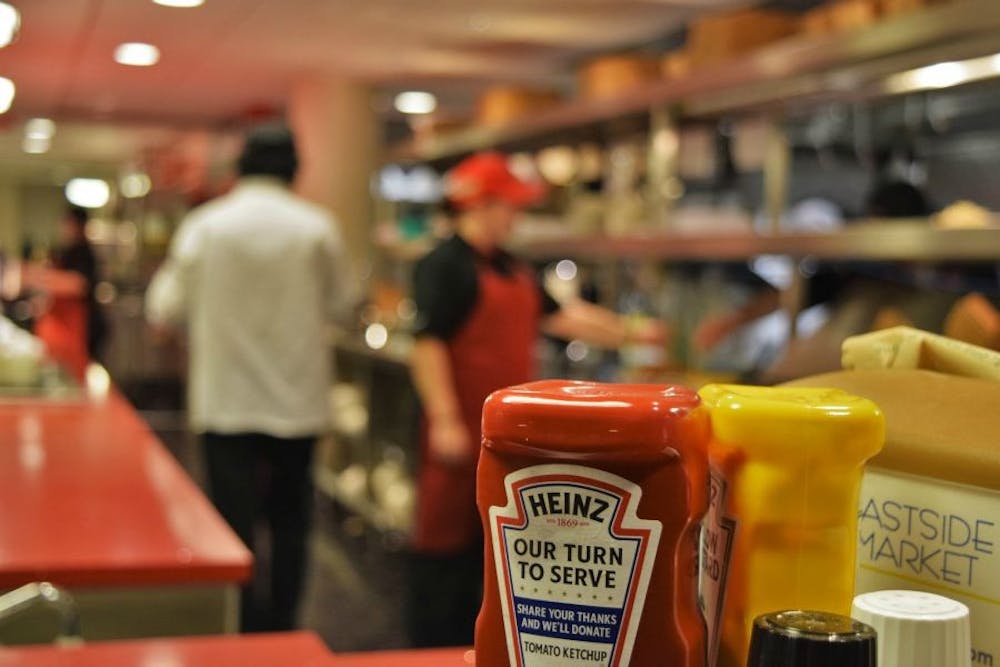By Laura Fitzgerald, Senior Staff Writer
While many students munch on mozzarella sticks or mac 'n' cheese for dinner, student athletes are faced with the challenge of eating healthy in the dining halls.
The general diet of a student athlete includes high levels of carbohydrates for energy, proteins to help students recover from training and moderate amounts of fat, said Paul Harker, director of athletic conditioning.
And there are healthy options in the dining halls, even if it isn't always what students prefer, Harker said.
"I think, by and large, you can eat well and get all the calories or the nutrients you need through our dining services," Harker said. "Maybe it's not the exact meal that you want or the option that you have in mind, but again, you don't always get what you want."
Sophomore Charlie Dauch is a varsity baseball player and said his diet depends on what he is doing that day. Most of his meals, he said, consist of lean protein, a side of carbohydrates and vegetables. Chicken is often a go-to dinner, he said.
"You need to eat healthy first of all," Dauch said. "It's pretty essential that you eat properly so you're able to perform to the best of your ability."
Dauch said, oftentimes, he ate at Martin Dining Hall when he lived in Brandon Hall as a first-year. He would have to eat the same food for dinner, and he said he wishes there were more healthy options in the dining halls.
"It just doesn't taste as great as other places," Dauch said. [Martin] really threw out a lot of hash browns and a lot of unhealthy things."
Harker said athletes' diets vary greatly, depending on the sport, the student's gender, whether they are in-season and whether they're trying to gain weight.
"It all depends on who that athlete is," Harker said. "If we're talking [about] a defensive lineman who plays football, it's going to be a complete 180 from one of our synchronized skating athletes."
Harker said the athletes themselves are responsible for making the right choices when choosing what to eat.
Enjoy what you're reading?
Signup for our newsletter
"Ninety-nine point nine percent of the accountability is on the athletes," Harker said. "We can tell them how they should eat and give them a direction and advice on what to eat, but at the end of the day, they're the ones making the decisions."
Dauch now lives in Heritage Commons, which has a full kitchen that allows him to cook a lot of his own meals. However, when he is short on time, his ability to eat healthy decreases.
"Sometimes you don't have time to eat healthy," Dauch said, "like we have practice at 6 p.m., and so I would grab something really quick like a slice of pizza, just [to] put something in my body."
Junior Jenna Weiner, a varsity soccer player, said eating healthy in the dining halls isn't too difficult, but she has to be conscious of the choices she makes.
"Going into the dining hall, I'm always thinking, 'what do I need to eat to perform on the field and in the weight room to the best of my ability?'" Weiner said.
She said it is easier to eat healthy when living off campus because she has greater control over the food she prepares and what goes into her meal.
"On campus, you really don't know what's going into some of the food," Weiner said.
Weiner said as a student athlete, she needs to eat more often than the average student to keep her metabolism up. She consumes between 3,000-4,000 calories a day to maintain energy for practice and games.
The recommended average daily calorie intake for moderately active 19-30-year-old females is 2,000-2,2000 calories, according to the 2010 Dietary Guidelines from the Office of Disease Prevention and Health Promotion. The recommended calorie intake for moderately active males is 2,600-2,800.
Her meals usually consist of lean proteins, vegetables, fruit, salad, yogurt or nuts.
Student athletes have different needs when it comes to making healthy decisions in the dining halls, and Weiner said she has to keep that in mind when she sees unhealthy foods on other students' plates.
"Sometimes it's really hard because people around me aren't eating what I'm eating," Weiner said. "So I have to focus on myself."




